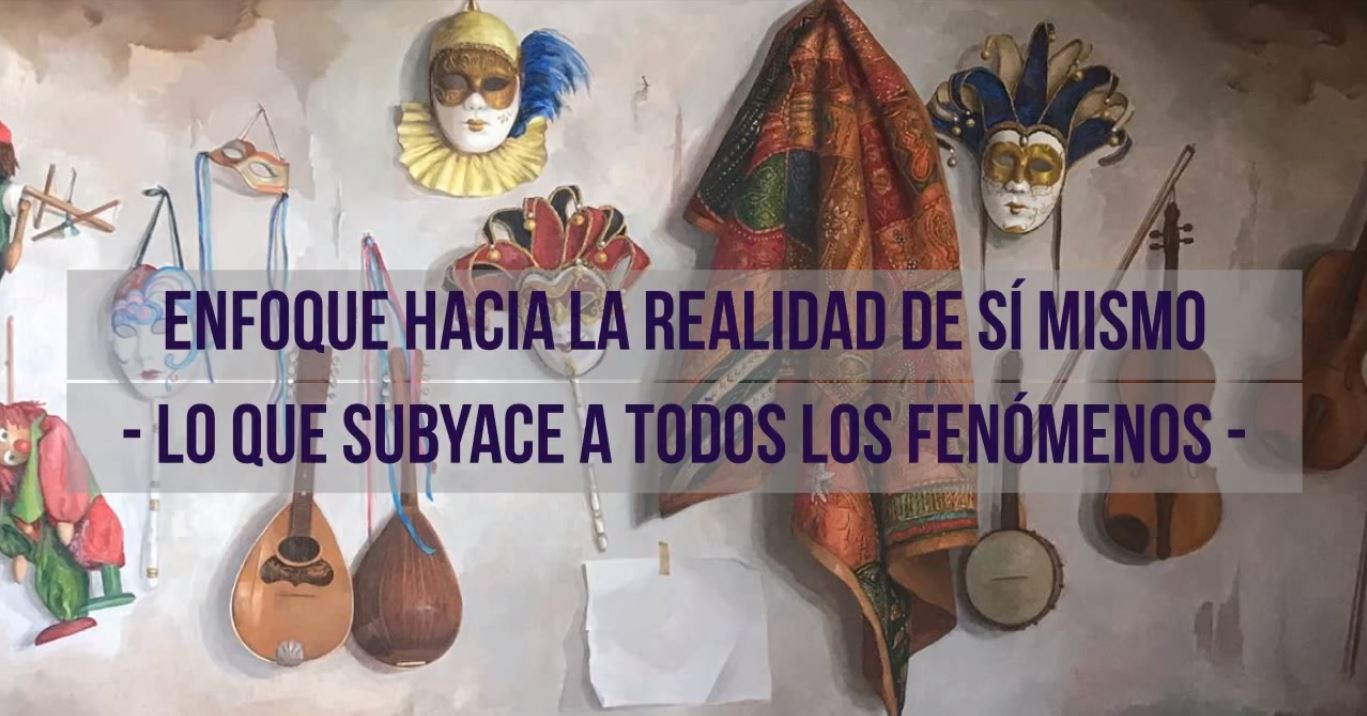
Se plantea que como individuos somos una ilusión que se proyecta en la conciencia esencial, y que somos la ilusión de ser los hacedores de las cosas. Esta ilusión de un sujeto observador separado de los fenómenos, que se considera a sí mismo hacedor y experimentador, debido a la fragmentación de la conciencia se identifica con el cuerpo y sus sentidos, como si fuera el sujeto que toma conciencia de las cosas, cuando realmente el cuerpo es un objeto más en la conciencia esencial.
En sánscrito, “Nir” significa “fuera de” y “Vana” significa “bosque”. Por tanto, Nirvana sería salir de la confusión, del laberinto, de los obstáculos, de la existencia condicionada, sumergida en la ignorancia, que tiene el poder de esconder y distorsionar la realidad, o dicho de otro modo, esta se interpreta erróneamente.
La variedad de múltiples objetos que vemos a nuestro alrededor conformando el mundo, es como las imágenes de una película proyectada en una pantalla. Aunque haya luz, sin esta pantalla no se puede ver la película. De igual modo, en la conciencia se reflejan las imágenes, ellas no permanecen sino que se reflejan. Muchos manifiestan que es el juego de lo Divino. Manifiestan que todas las formas son relativas y cambiantes, que el mundo de la ilusión cambia continuamente, y se ve a la expresión de lo Divino como una obra dinámica. Aunque una confusión de las cosas, como diferenciación es positiva porque esta ilusión es la fuerza de la obra que se comporta en forma causativa, reaccionaria y permite el reconocimiento del flujo del universo como experiencia de la manifestación. De esta manera digo que el mundo no tiene existencia independiente, es un atributo de lo Absoluto.
Salir del laberinto no es pasar a una condición distinta, sino que es dejar de lado los condicionamientos de todo tipo. Salir del bosque no es realmente salir, sino que es soltar las cadenas que nos confundían con las ilusiones. Aparece un ver sin verbalizar que es ser uno con todo. Ya no hay diferencias entre el observador y lo observado, se es pura conciencia desenvuelta en percepción. Esto significa, por ejemplo: que si vas caminando por la calle y te encuentras mirando cómo pasan los vehículos, sin pensar en la identidad, sin hacer cálculos, no necesitas armar ideas de lo que ves, solo se está ahí, sin pensar en un lugar. La inteligencia esencial se ocupa de mover el cuerpo, cruzando el paso peatonal, en estado de alerta, sin la presión de la identidad, tampoco como un autómata, sino todo en plena conciencia, unidad de todo, percibiendo todo y sin hacer diferencias. Ver sin verbalizar en la observación sin juicio.
R.Malak
Outside the forest of duality.
There is the proposition that as individuals we are an illusion that is projected onto essential consciousness and that we are the illusion of being the doers of actions. This illusion of an observer subject separate from phenomena, considered himself as a doer and experiencer, due to the fragmentation of consciousness is identified with the body and senses, as if the subject who becomes aware of things, when actually the body is another object in essential consciousness.
In Sanskrit, "Nir" means "outside" and "Vana" means "forest." Therefore, Nirvana would be: to get out of the confusion, of the labyrinth, of the maze of obstacles, of conditioned existence, immersed in ignorance, which has the power to hide and distort reality, or put in other way, this reality is misunderstood.
The variety of multiple objects we see around us giving shape to the world is like the movie images projected on a screen. Although light is there, without this screen you cannot see the movie. Similarly, in consciousness images are reflected, they do not remain but are reflected. Many state that is the play of the Divine. They claim that all forms are relative and changing, that the world of illusion is continually changing, and the expression of the Divine is seen as a dynamic force. Although a confusion of things, such differentiation is positive because this illusion is the strength of the work that behaves as causative, reactionary and allows the recognition of the flow of the universe as an experience of manifestation. Thus I say, the world has no independent existence, it is an attribute of the Absolute.
Leaving the labyrinth is not moving to a different condition, but to put aside the constraints of all kinds. To exit the forest is not really leaving, but releasing the chains that merge us with the illusions. A seeing without verbalizing appears, which is to be one with everything. There are no more differences between the observer and the observed; it is pure consciousness in unfolded perception. This means for example that if you are walking down the street and find yourself watching vehicles pass without thinking about identity, without doing calculations, you need not put together ideas of what you see, there is only being there, without thinking in a place. The essential intelligence deals with moving the body, going through the pedestrian crossing, in an alert state, without the pressure of the identity, not as an automaton, but all in complete consciousness, unity of everything, noticing everything, and without distinction. View without verbalizing on observation without trial.
R.Malak
(traducido por Maria Luisa)

Comentarios